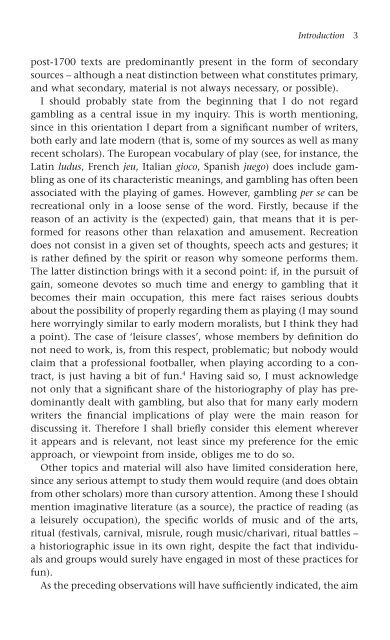Recreation in the Renaissance
Recreation in the Renaissance
Recreation in the Renaissance
- No tags were found...
Create successful ePaper yourself
Turn your PDF publications into a flip-book with our unique Google optimized e-Paper software.
Introduction 3<br />
post-1700 texts are predom<strong>in</strong>antly present <strong>in</strong> <strong>the</strong> form of secondary<br />
sources – although a neat dist<strong>in</strong>ction between what constitutes primary,<br />
and what secondary, material is not always necessary, or possible).<br />
I should probably state from <strong>the</strong> beg<strong>in</strong>n<strong>in</strong>g that I do not regard<br />
gambl<strong>in</strong>g as a central issue <strong>in</strong> my <strong>in</strong>quiry. This is worth mention<strong>in</strong>g,<br />
s<strong>in</strong>ce <strong>in</strong> this orientation I depart from a significant number of writers,<br />
both early and late modern (that is, some of my sources as well as many<br />
recent scholars). The European vocabulary of play (see, for <strong>in</strong>stance, <strong>the</strong><br />
Lat<strong>in</strong> ludus, French jeu, Italian gioco, Spanish juego) does <strong>in</strong>clude gambl<strong>in</strong>g<br />
as one of its characteristic mean<strong>in</strong>gs, and gambl<strong>in</strong>g has often been<br />
associated with <strong>the</strong> play<strong>in</strong>g of games. However, gambl<strong>in</strong>g per se can be<br />
recreational only <strong>in</strong> a loose sense of <strong>the</strong> word. Firstly, because if <strong>the</strong><br />
reason of an activity is <strong>the</strong> (expected) ga<strong>in</strong>, that means that it is performed<br />
for reasons o<strong>the</strong>r than relaxation and amusement. <strong>Recreation</strong><br />
does not consist <strong>in</strong> a given set of thoughts, speech acts and gestures; it<br />
is ra<strong>the</strong>r def<strong>in</strong>ed by <strong>the</strong> spirit or reason why someone performs <strong>the</strong>m.<br />
The latter dist<strong>in</strong>ction br<strong>in</strong>gs with it a second po<strong>in</strong>t: if, <strong>in</strong> <strong>the</strong> pursuit of<br />
ga<strong>in</strong>, someone devotes so much time and energy to gambl<strong>in</strong>g that it<br />
becomes <strong>the</strong>ir ma<strong>in</strong> occupation, this mere fact raises serious doubts<br />
about <strong>the</strong> possibility of properly regard<strong>in</strong>g <strong>the</strong>m as play<strong>in</strong>g (I may sound<br />
here worry<strong>in</strong>gly similar to early modern moralists, but I th<strong>in</strong>k <strong>the</strong>y had<br />
a po<strong>in</strong>t). The case of ‘leisure classes’, whose members by def<strong>in</strong>ition do<br />
not need to work, is, from this respect, problematic; but nobody would<br />
claim that a professional footballer, when play<strong>in</strong>g accord<strong>in</strong>g to a contract,<br />
is just hav<strong>in</strong>g a bit of fun. 4 Hav<strong>in</strong>g said so, I must acknowledge<br />
not only that a significant share of <strong>the</strong> historiography of play has predom<strong>in</strong>antly<br />
dealt with gambl<strong>in</strong>g, but also that for many early modern<br />
writers <strong>the</strong> f<strong>in</strong>ancial implications of play were <strong>the</strong> ma<strong>in</strong> reason for<br />
discuss<strong>in</strong>g it. Therefore I shall briefly consider this element wherever<br />
it appears and is relevant, not least s<strong>in</strong>ce my preference for <strong>the</strong> emic<br />
approach, or viewpo<strong>in</strong>t from <strong>in</strong>side, obliges me to do so.<br />
O<strong>the</strong>r topics and material will also have limited consideration here,<br />
s<strong>in</strong>ce any serious attempt to study <strong>the</strong>m would require (and does obta<strong>in</strong><br />
from o<strong>the</strong>r scholars) more than cursory attention. Among <strong>the</strong>se I should<br />
mention imag<strong>in</strong>ative literature (as a source), <strong>the</strong> practice of read<strong>in</strong>g (as<br />
a leisurely occupation), <strong>the</strong> specific worlds of music and of <strong>the</strong> arts,<br />
ritual (festivals, carnival, misrule, rough music/charivari, ritual battles –<br />
a historiographic issue <strong>in</strong> its own right, despite <strong>the</strong> fact that <strong>in</strong>dividuals<br />
and groups would surely have engaged <strong>in</strong> most of <strong>the</strong>se practices for<br />
fun).<br />
As <strong>the</strong> preced<strong>in</strong>g observations will have sufficiently <strong>in</strong>dicated, <strong>the</strong> aim










